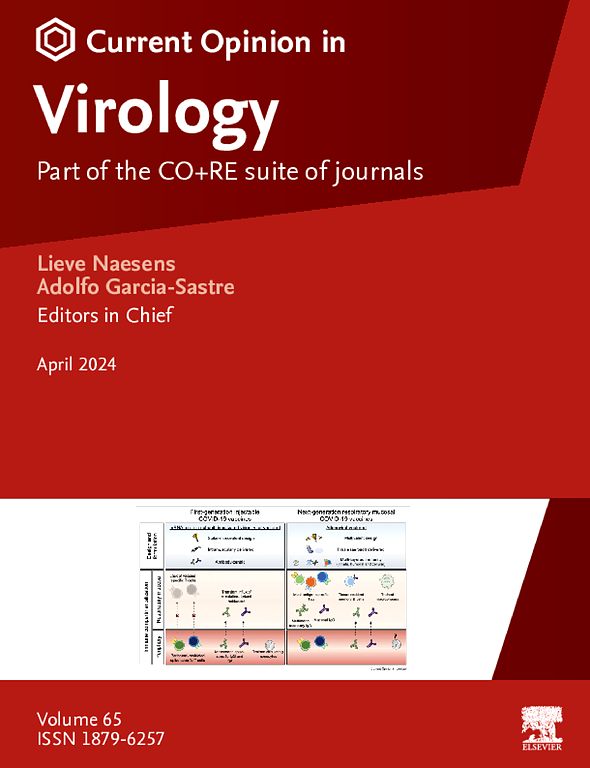Status of advanced respiratory syncytial virus antiviral therapeutics 2025
IF 5.1
2区 医学
Q1 VIROLOGY
引用次数: 0
Abstract
Respiratory syncytial virus (RSV) causes major morbidity and mortality in vulnerable populations. In infants, RSV infection is a leading cause of hospitalization and can result to severe respiratory complications marked by bronchiolitis and viral pneumonia. Currently, prophylaxis exists in the form of three licensed vaccines, all approved for adults aged >65 years or pregnant women, but no vaccination is available specifically for infants. Prophylactic monoclonal antibody treatments, palivizumab and nirsevimab, are recommended in some instances for newborns, but treatment cost and need for intravenous administration limit universal accessibility. The only antiviral approved for the RSV indication, ribavirin, is no longer recommended for clinical use, creating an urgent need for a novel generation of effective therapeutics. Extensive anti-RSV drug discovery efforts have long been dominated by viral entry inhibitors that emerged as pharmacodominant in automated drug discovery campaigns, yet more recently developed candidates have expanded the target range to the viral polymerase complex and nucleoprotein. Focusing on advanced therapeutic candidates and investigational drugs that have entered clinical trials, this review will discuss challenges in RSV drug development in perspective of recent breakthroughs in RSV prophylaxis, assess the current stage of RSV therapeutic candidates, and identify key requirements for future improved RSV disease management.
晚期呼吸道合胞病毒抗病毒治疗的现状2025
呼吸道合胞病毒(RSV)在脆弱人群中引起主要发病率和死亡率。在婴儿中,呼吸道合胞病毒感染是住院的主要原因,并可导致以细支气管炎和病毒性肺炎为特征的严重呼吸道并发症。目前,预防措施以三种许可疫苗的形式存在,所有疫苗都被批准用于65岁以上的成年人或孕妇,但没有专门针对婴儿的疫苗。预防性单克隆抗体治疗,帕利珠单抗和尼塞维单抗,在某些情况下被推荐用于新生儿,但治疗费用和静脉给药的需要限制了普遍可及性。唯一被批准用于RSV适应症的抗病毒药物利巴韦林已不再推荐用于临床,因此迫切需要新一代有效的治疗方法。长期以来,广泛的抗rsv药物发现工作一直由病毒进入抑制剂主导,这些抑制剂在自动药物发现活动中作为药物优势出现,但最近开发的候选药物已将靶标范围扩大到病毒聚合酶复合物和核蛋白。本综述将重点关注已进入临床试验的先进候选治疗药物和研究药物,从RSV预防的最新突破角度讨论RSV药物开发面临的挑战,评估当前阶段的RSV候选治疗药物,并确定未来改进RSV疾病管理的关键要求。
本文章由计算机程序翻译,如有差异,请以英文原文为准。
求助全文
约1分钟内获得全文
求助全文
来源期刊

Current opinion in virology
VIROLOGY-
CiteScore
11.80
自引率
5.10%
发文量
76
审稿时长
83 days
期刊介绍:
Current Opinion in Virology (COVIRO) is a systematic review journal that aims to provide specialists with a unique and educational platform to keep up to date with the expanding volume of information published in the field of virology. It publishes 6 issues per year covering the following 11 sections, each of which is reviewed once a year: Emerging viruses: interspecies transmission; Viral immunology; Viral pathogenesis; Preventive and therapeutic vaccines; Antiviral strategies; Virus structure and expression; Animal models for viral diseases; Engineering for viral resistance; Viruses and cancer; Virus vector interactions. There is also a section that changes every year to reflect hot topics in the field.
 求助内容:
求助内容: 应助结果提醒方式:
应助结果提醒方式:


